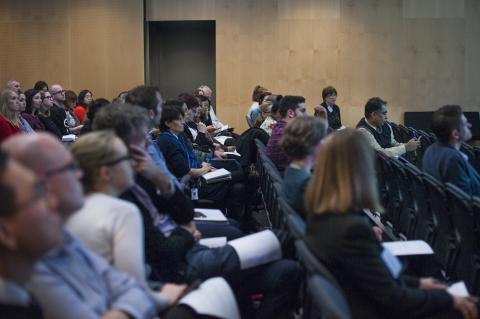
The Melbourne Genomics symposium, “Demonstrating success: Outcomes 2014-2015”, was held at the Walter and Eliza Hall Institute and attended by more than 160 professionals.
Demonstration Project Steering Group Chair, Professor James Angus, gave a warm welcome to the event, noting the Alliance’s significant achievements over the past three years.
Presentations were delivered on each of the five clinical ‘Flagship’ projects, discussing insights that ranged from individual case studies, to cost-effectiveness data to clinical outcomes data. Clinician-researcher Edward Chew presented on the acute myeloid leukaemia project, followed by clinicians A/Prof Alison Trainer on colorectal cancer, A/Prof Tiong Tan on childhood syndromes, Dr Piero Perucca on focal epilepsy and Dr Maie Walsh on hereditary neuropathy.
“It was wonderful to see key findings and learnings from all five flagships presented at the one event,” said Dr David Hansen, CEO of CSIRO's Australian e-Health Research Centre, and a member of the Melbourne Genomics Executive Management Committee. “Snapshots from this data have been presented at national and international conferences, but the symposium provided an opportunity to bring it all together, and present key findings in the context of the entire Demonstration Project.”
Afternoon tea was followed by two panel sessions and individual speakers focusing on what the various professionals involved in the Demonstration Project had learned from each other, as well as how everyone learned from patients.
Panellists addressed the benefits and challenges of shared approaches to genomic testing, as well as how genomics – more than any other form of testing – requires professional input from multiple disciplines: clinicians, diagnostic scientists and bioinformaticians.
One panellist best summed up the Alliance’s contribution: “Genomic medicine is complex and resource-intensive. No one organisation can be the best at every part of it. That’s why we need collaboration.”
These professional panels were contextualised by three presentations on learnings from the patient experience: patient views on testing and the storage and sharing of genomic data for medical research; patient and public views on the governance of genomic data; and patient preferences for receiving information about genomic testing.
A report from the Melbourne Genomics Community Advisory Group, focusing on the impact co-design has had on the project through early and ongoing community collaboration and patient input, drew together key themes from the afternoon.
Liat Watson, presenting on behalf of the Community Advisory Group, said: “A key achievement of Melbourne Genomics has been keeping patients and their needs at the centre of the project to implement genomics in Victoria.”
